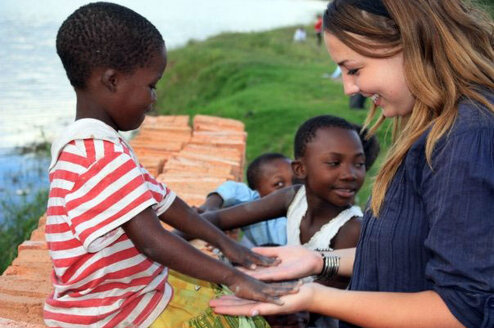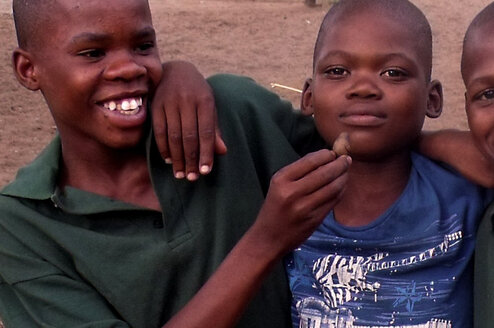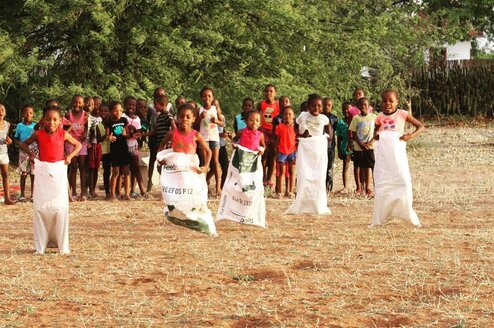Taking a year out with Project Trust was one of the best choices I have ever made; instead of rushing into University it has given me the time to mature, reflect on myself and think about where my interests lie. Therefore when I return to the UK I will have a better idea of how I want to progress in work or higher education. It has opened my eyes to just how tough it is living in a third world country, and I have seen things that some people never experience in their lives. This has made me more aware of the problems that we have in our world and made me realise just how lucky I am, there are things that I would never have thought I should be grateful for until I came to Swaziland, but now I am grateful for just about everything because I have seen just how little some people have. I feel like I have matured more in these first 5 months of being in Swaziland than I have in the last two years of college in England; I have grown up and taken on responsibilities that most people won’t come across until their adult working life, this can only be an advantage once I return home!
Highlights: It’s so hard to pick a highlight of my program so far! I enjoy everything I do, and I know that there’s more to come with every single day I spend here... Right now I would have to say that my highlight of my program has been getting to know and love the people that I work alongside and the children that I work with. Small things such as learning all 60 names of the children at our preschool feel like mountainous achievements; when we first arrived in Swaziland I took one look at the register and couldn’t even begin to think about how to pronounce the names – now I know how to say all the names, who they belong to and I can speak some basic SiSwati so I can actually tell them what I want them to do! Well, to an extent. Everything like this just enriches the time that I spend here, and one of my most favourite highlights so far is getting to know the children and their personalities... You don’t realise just how much you are learning about them until you talk to friends and family from back home and tell them the stories that happen. You get to learn who are the cheeky ones, the trouble makers, the ones who will do everything you ask and even the 4 year olds who look cute as a button but according to your Swazi translator they swear like a sailor!
So far the highlight of my overall experience here has been setting up Christmas presents for the children at our preschool and the children at soup kitchen. My project partner and I set up an appeal on Facebook aimed at our family and friends, we asked for people to donate £10 each to sponsor the gift for one child. In total we managed to raise over £600 and for every child for Christmas we bought them; a backpack, shoes, clothes, toys, sweets, a folder and a pencil case with pens/colours/scissors/rubber/ruler/sharpener etc... everything! At this moment in time we haven’t actually handed out the gifts yet, as it is too early – but they have all been bought and they are sitting in gigantic piles in our small bedrooms taking up all our space. I’m looking forward to giving out the gifts more than anything else so far! I can’t wait to see the excitement and joy on their faces when they open their new backpacks; it will be worth every penny spent, every hour spent shopping and every strained muscle carrying our wares with us!
Both of these entries are about the children that I work with – which has made me realise, it is the children who are the sole highlight of my trip. They are the reason I am here, they are what is keeping me here, and they are the reason I will be a better person when I leave. They teach me so much everyday and they don’t even know it, they are amazing human beings considering their situations and each one of them means the world to me.
Morning: I have quite a busy schedule! My volunteering partner and I live in a girl’s hostel in a fairly privileged high school, so every morning the bell goes at 5am to get the girls out of bed! Can’t say that I rise and shine happily at 5am; but I do get up for breakfast at 6:30am sharp, otherwise I know that I’ll be eating my own arm by the time it gets to lunch at 1:30.
The main part of the work we do out here in Swaziland is preschool teaching; we teach in two different preschools so our mornings vary throughout the week. On Mondays, Wednesdays and Fridays we go to a preschool called Injabulo, it is run completely by the two of us and there’s one other lady there called Teacher Nelsiwe and she helps us with SiSwati translations. There are only two small classrooms for us to teach in, and there are 60 children at the preschool, we really have our hands full as we are the only teachers there. We leave hostel around 7:15 and walk to our hosts house (our host is someone who is appointed as our ‘guardian’ whilst we are here), at their house we fill up containers with 30 litres of safe drinking water to take to the preschool and make peanut butter sandwiches to give to the children as a snack.
We load all of this into a big white truck we drive that has been named ‘Butch’ by previous volunteers (an appropriate choice of name I can assure you, it is a monster!), and set off along the badly tarred roads, gravel tracks and small bridges over rivers that it takes to get us to our preschool that is out in the middle of nowhere. Once in the village we pick up children along the way and pile them into the back of the truck, you’d be surprised at the number of 3-5 year olds you can compact into the back, we must manage about 15 on a standard day and 20-30 if the weather is bad and they decide not to walk! A little fact about the people of Swaziland, when it rains they take it as a ‘day off’; they stay in their homesteads, light a fire and sleep. You’d get nothing done if that was the attitude in England!
We aim to start teaching around 8:30-8:45, so until then we hand out the peanut butter sandwiches and water, send them to the toilet, get them to wash their hands and then we all stand together outside and sing ‘You are the Light of the World’. Those are the only 7 words to the song, so we get them to scream it so loud you want to cover your ears and then they whisper it like a mouse, it’s a really great way for us to get them warmed up for the day and ready to learn! As they are quite young (and we teach in English) the material that we get through is only basic; we teach letters, numbers, counting, body parts, colours, weather, objects, shapes etc... I love teaching at Injabulo, although it is very challenging with the language barrier, we have mastered classroom SiSwati commands so we can control the children, but you do have to use a lot of hand gestures and physically demonstrate to them what you want them to do!
From 11:15-12:00 we bring both our classes together for song and dance; there’s no electricity in the preschool so we only have our voices, and they aren’t too great! Although we are horrendous singers the children seem to enjoy themselves and we make up for our bad singing with enthusiasm and hilarious dancing. We teach religious songs, children’s nursery rhymes, educational songs and they also sing SiSwati preschool songs and practice traditional Swazi dancing. After preschool we pile them back into the truck and drop them back off where we found them that morning!
Tuesdays and Thursdays we work at a place called Moriah Center; it is a Christian Preschool that is sponsored by an American church in the village of Big Bend where we live. It is a 30 minute walk away and we set off at 7:15, ready for the preschool starting at 8am. The Moriah Centre is different to Injabulo in every way, shape and form; there are only 35 children in the whole preschool and there are a minimum of two teachers to one class. The largest class has only 12 pupils. Moriah Centre has so many resources to its disposal and the learning and teaching that happens there is really brilliant. We have great fun helping out with the children, and my favorite part is when they all go into the hall and watch song and dance DVD’s and we all join in! It’s a tiring 45 minutes, but so much fun, and I’m always shocked at how well the children can sing all the songs, when all of them are in English!
Afternoon: Lunch is at 1:30 every day, so we put out plastic boxes in the girls and boys hostel dinner halls to collect their unwanted food (this will make sense later!), then our usual afternoons consist of paperwork and account for Injabulo our preschool, planning and preparation for our lessons and writing thousands of letters to businesses for food donations for lunch times at Injabulo. Injabulo takes over our lives, but we love it because we love the children!
On Tuesdays and Fridays we also cook in the hostel kitchen; we take all of the food that we have collected from hostel and cook a soup/stew in a pot that must weigh about a tonne! This is because on Tuesdays and Fridays we run another project called ‘Soup Kitchen’; we drive out to Mpolongeni, Siteki a really poor and rural area where the population has been devastated by HIV and AIDS. We arrive and unload everything onto a long metal table; we stand for about 15 minutes while the children sing under a tree and say their prayers. Most of the children only have a single parent and there are about 20 orphans out of the 60 who we feed. Many of them bring their tiny brothers and sisters along as they have no one to care for them, some of these children are only 3-4 years old themselves, and they walk for kilometres with these babies on their backs just for a helping of our food... The children then say “Thank you for bring us food” and we reply with “You are very welcome”, and they all rush forwards to the table and thrust their tatty bowls and plates out to us. A lady called Aunty Vina who lives at Soup Kitchen oversees the whole thing, and she keeps them in line when they get too rowdy! She’s amazing, and houses 8 of the orphans herself.
After we have dished up the fun begins! We normally play football with the children, ball games, sing and dance and play group games together. With the smaller ones we sing “If you want to play make a big circle” and they all reply “BIG CIRCLE” and run towards us to join hands and make a huge circle. We normally do the Hockey Cokey which they LOVE, and we clap and sing the words “dance baby dance, dance baby dance” and people take turns going into the middle of the circle and dancing for everyone! It is so much fun, and the children are so amazing that you forget just how poor they are until you take a step back and actually look at them in their ragged clothes, bare feet and unwashed skin. Never in my life have I been around children full of so much joy, energy and love.
Evening: Compared to our packed days our evenings are luckily not as busy! Dinner at hostel is at 6pm, and after then is prep time for the girls – we usually go down to the staffroom and print off resources for our preschool. The bell in hostel goes at 9pm for bed-time and we are responsible for making sure that the girls in the rooms around ours are quiet. This is a challenge because during the day we act as friends to them, then it turns 9pm and we’re telling them to get into bed!





